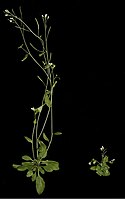
Photo from wikipedia
MAIN CONCLUSION Peptide-receptor complexes activate distinct downstream regulatory networks to mediate plant adaptions to abiotic environmental stress. Plants are constantly exposed to various adverse environmental factors; thus they must adjust… Click to show full abstract
MAIN CONCLUSION Peptide-receptor complexes activate distinct downstream regulatory networks to mediate plant adaptions to abiotic environmental stress. Plants are constantly exposed to various adverse environmental factors; thus they must adjust their growth accordingly. Plants recruit small secretory peptides to adapt to these detrimental environments. These small peptides, which are perceived by their corresponding receptors and/or co-receptors, act as local- or long-distance mobile signaling molecules to establish cell-to-cell regulatory networks, resulting in optimal cellular and physiological outputs. In this review, we highlight recent advances on the regulatory role of small peptides in plant abiotic responses and nutrients signaling.
Journal Title: Planta
Year Published: 2022
Link to full text (if available)
Share on Social Media: Sign Up to like & get
recommendations!